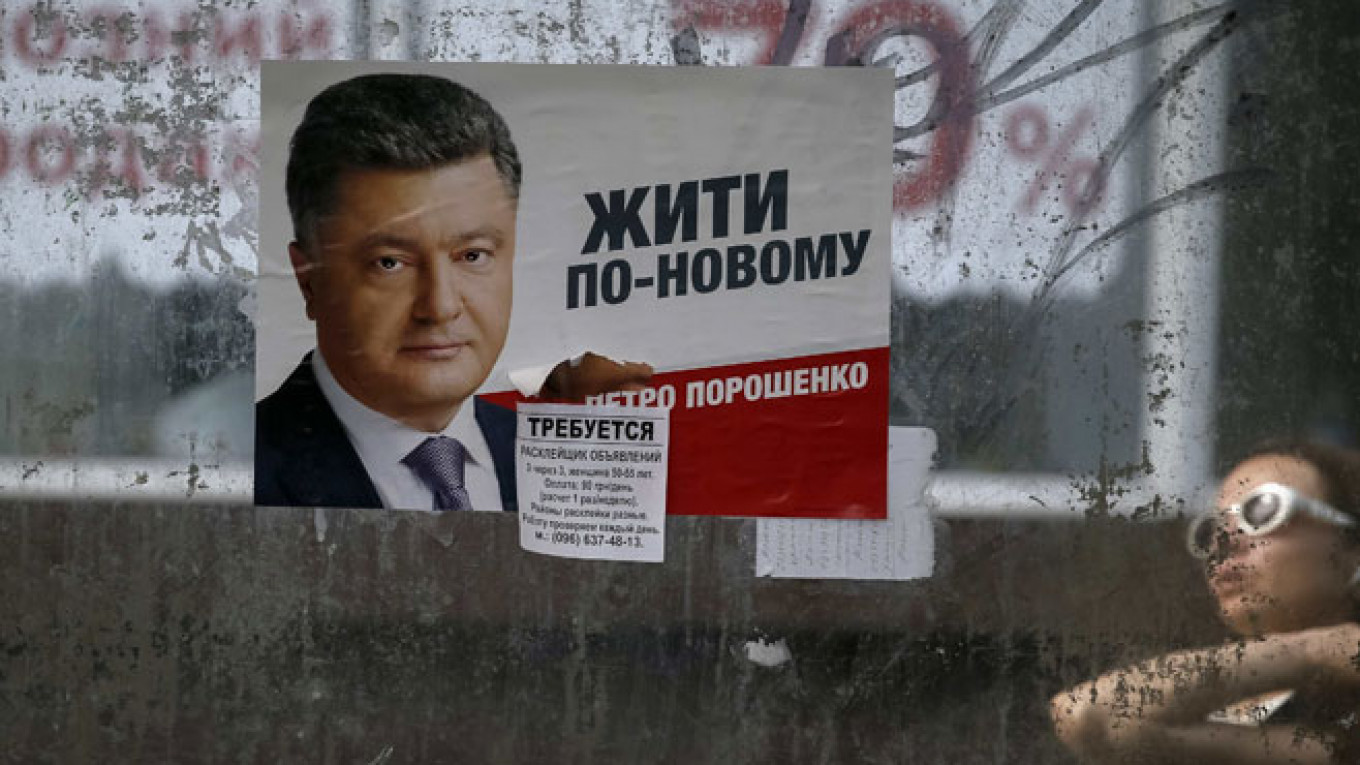For the last several months, state-controlled television stations have been bombarding their viewers with the message that the radical right-wing political group Right Sector and other "fascists" have seized power in Ukraine.
Moderate Petro Poroshenko's landslide victory over Right Sector in Ukraine's presidential election on Sunday should make viewers more skeptical of state media, but they are likely to keep believing in the Kremlin's line.
State-controlled television channels had completely given up even the semblance of plausibility in their coverage of the Ukrainian crisis even before the results of the Ukrainian presidential election. A recent "news" broadcast on the Rossia channel used footage filmed a year before in the Caucasus in a segment on atrocities committed by Ukrainian forces in the country's eastern regions. Only last week, Channel One reported on a major pro-Russian demonstration in Rome. However, viewers who know Italian were probably surprised to see that the posters demonstrators were holding made no reference to Russia, but complained of cuts to social benefits by the Italian government.
I wonder how Kremlin spin doctors will "spin" their way out of the current predicament. Will they claim that, thanks to Russian television coverage, the Ukrainian people realized how dangerous Right Sector is and "just said no" to fascism in the elections? That will not work because it would deprive them of their primary weapon — the claim that fascism threatens Ukraine's future. If that were true, what would the pro-Russian secessionists be fighting against? Their own shadows? No, Kremlin propagandists will need to play the "fascism card" many more times in the future and are not about to let go of it now.
Will they declare that Ukraine's new president is just a frontman for Right Sector and a fascist at heart? Or else that the compromised "fascist" Yarosh has handed over leadership of his party to someone else?
Of course, social media users can very quickly unmask the lies contained in fabricated media reports, and bloggers easily identify the real sources of images broadcast on television. But even the most popular blog has a readership of only several thousand people whereas millions of Russians watch state television. A poll by the Levada Center, a Moscow-based independent research organization, revealed that 94 percent of the population relies on domestic television networks to follow developments in Ukraine and Crimea.
What is surprising is that, despite the fact that more than 50 percent of the population now has Internet access, many people continue to get their news from television. In fact, not only do people get their news from television, but they form their worldview based on what they see on the screen.
The real problem with Russia is not that five state-controlled television channels have brainwashed the population with lies and propaganda, or that Putin eliminates all major independent and opposition media the moment they gain popularity. The problem with today's Russia is that the people do not demand the truth.
Today, society is only a slightly modified version of Soviet society and continues to think of the state as a paternal figure. The state feeds us, cares for us, gives us apartments to live in and pensions when we grow old. It explains to us what is good and what is bad. Our job is to believe what this kind father tells us — and even if he lies, we must believe that it is for our own good.
Andrei Malgin is a journalist, literary critic and blogger.
A Message from The Moscow Times:
Dear readers,
We are facing unprecedented challenges. Russia's Prosecutor General's Office has designated The Moscow Times as an "undesirable" organization, criminalizing our work and putting our staff at risk of prosecution. This follows our earlier unjust labeling as a "foreign agent."
These actions are direct attempts to silence independent journalism in Russia. The authorities claim our work "discredits the decisions of the Russian leadership." We see things differently: we strive to provide accurate, unbiased reporting on Russia.
We, the journalists of The Moscow Times, refuse to be silenced. But to continue our work, we need your help.
Your support, no matter how small, makes a world of difference. If you can, please support us monthly starting from just $2. It's quick to set up, and every contribution makes a significant impact.
By supporting The Moscow Times, you're defending open, independent journalism in the face of repression. Thank you for standing with us.
Remind me later.






